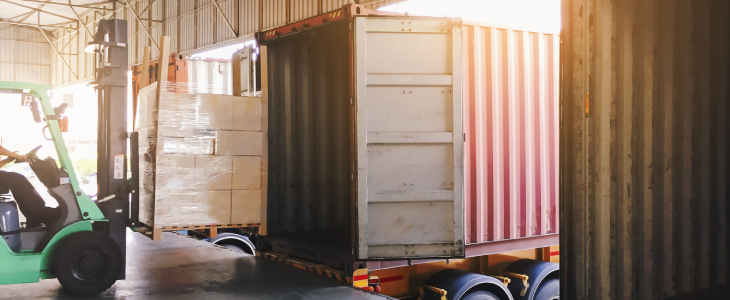Large trucks must be properly loaded in order to help and promote the safety of everyone on the road. In fact, the importance of proper loading is recognized at a federal level by the Federal Motor Carrier Safety Administration (FMCSA) as it has established regulations for the loading and securing of truck cargo as well as protocols for inspecting cargo. When these regulations are not properly observed, an improperly loaded truck accident can be the result.
You should not have to carry the cost and pain caused by the negligence of another. If you have been injured in an accident caused by an improperly loaded truck, you have the legal right to recover compensation for the harm and losses you have sustained as a result. Our team of North Dakota personal injury attorneys is here to see to it that your legal rights are enforced and help you pursue the compensation to which you are fully entitled.
How Can Cargo Be Loaded Improperly?
What does it mean for a truck to be improperly loaded? Well, it can mean a couple of different things. For starters, it could mean that the truck has been overloaded with cargo, making it too heavy. Alternatively, it could mean that the cargo has been loaded in a way that is out of balance. Without an even distribution of cargo weight, the handling of the truck could be adversely impacted. Improper loading can also mean that the cargo has not been properly secured. Without proper restraints being used to secure the cargo, dangerous shifts in the cargo could occur while the truck is moving.
How Cargo Should Be Properly Secured
Pursuant to FMCSA regulations, both truck carriers and truck drivers carry responsibility for properly securing cargo. There are detailed rules in place regarding what it means to properly secure cargo. According to the rules, the cargo of a truck must:
- Be properly distributed
- Be properly secured
- Not obstruct the driver’s view
- Not prevent the driver’s free motion of arms or legs
All tailgates, doors, and any other truck equipment on board must also be secured. Everything should be secured using certain loading equipment such as:
- Binders
- Bracing
- Chains
- Friction mats
- Hooks
- Rope
- Straps
- Winches
Truck drivers should also pay close attention to special loading rules pertaining to equipment and cargo. For instance, trucks carrying these items are subject to special rules in addition to the general cargo loading rules:
- Automobiles
- Concrete pips
- Logs
- Lumber
- Metal coils
- Large rocks
Driver’s Duty to Inspect Cargo
Not only are drivers required to properly load cargo, but they also have a responsibility to inspect their cargo at regular intervals. This is to help ensure that the cargo remains properly secured and loaded. During inspection, drivers need to check to see that the cargo is secure and the devices used in securing the cargo are still in good working condition. Any securing devices in disrepair must be replaced and the carrier must be notified of such prior to the driver setting out on their trip. In certain cases, a driver may need to add more securing devices in order to help ensure the proper loading of the truck cargo.
Truck drivers must inspect the cargo:
- Before the trip begins
- A minimum of one time within the first 50 miles of the trip
- When the driver changes their duty status
- Every three hours or 150 miles (whatever happens first)
The Dangers of Improperly Loaded Trucks
An improperly loaded truck can be catastrophic. Accidents caused by improperly loaded trucks can cause severe injuries and significant damage. The main danger of an improperly loaded truck is twofold. First, the cargo itself can prove dangerous to other vehicles on the road, causing accidents and pileups. Second, the improperly loaded cargo can make the truck difficult to safely operate, leading to accidents.
You see, improperly loaded cargo can shift en route. The shifting can turn to falling off of the truck. Cargo that falls onto the roadway could land directly on another vehicle or in the direct pathway of a vehicle. Drivers may be unable to stop in time prior to impact with the cargo. They may swerve in order to avoid crashing into the cargo, but end up causing an accident due to swerving away from the cargo.
Considering the substantial size and weight of some truck cargo, cargo falling off of an improperly loaded truck could spell disaster for nearby drivers. Some trucks haul vehicles, construction trucks, heavy machinery and equipment, logs, and piping. Any of these things falling off of a truck on the roadway could easily cause a serious, and even fatal, crash.
Improperly loaded cargo can also render the truck unsafe. The weight distribution on a truck is important. Improperly loaded cargo can mean that the weight distribution is off or it could result in a shift in the cargo that can then lead to uneven weight distribution. As a result, the shift in weight distribution may cause the truck to roll over. Cargo that is not safely secured could shift over to one side of the truck and cause the truck to jackknife. A jackknifing truck could impact cars across several lanes of traffic. The shift in cargo could also lead to the driver losing control of the truck, leading to serious accidents and multivehicle pileups.
Contact Our North Dakota Improperly Loaded Truck Accident Attorneys Today
The sooner you reach out to our team of trusted legal advocates after an accident, the sooner we can begin fighting for you. If you have been injured in a North Dakota improperly loaded truck accident, we are here to help and support you during this difficult time. Contact our office today for a free consultation.
